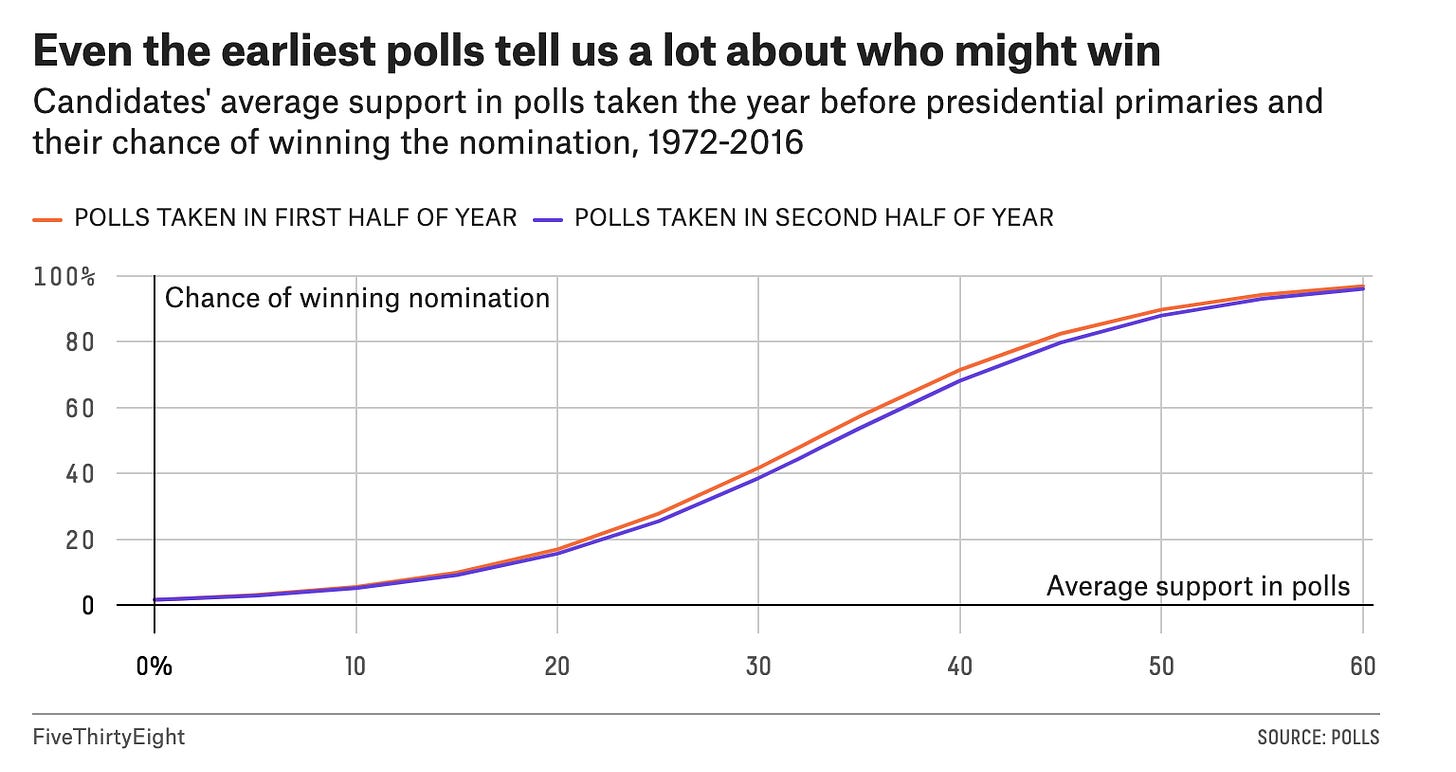The more that Americans recognize Trump’s escalating radicalism, the worse his prospects of winning the presidency.

The media just faced its first significant test of the 2024 election cycle last week: how to cover the first-ever indictment of a former president. The results aren’t encouraging.
Trump’s Monday odyssey from Florida to Manhattan turned into a media frenzy light on substance and heavy on sensationalism. Cable networks followed Trump’s every move in live “breaking news” feeds from Mar-a-Lago to the Palm Beach Airport, and then filled a few hours with vapid speculation before turning back to the live feed to watch Trump’s plane touch down at LaGuardia. Never mind that the charges against Trump hadn’t even been made public yet––it was good entertainment.
“Every network was on it forever, and then it lands, and we’re on the Trump plane. We gave the guy, I would guess, $40 to $50 million of earned media,” MSNBC host Joe Scarborough said last week.
The spectacle was reminiscent of Trump’s first presidential campaign, when the media hung on his every word and enabled his rise from an anti-Obama shock jock to the defining character of the populist American Right. By February 2016, Trump had already benefited from $2 billion in earned media, helping him clinch the Republican nomination despite the party leadership’s best attempts to stop him. By the end of the general election, he would receive an estimated $5 billion in earned media, paving his way to the presidency.
In 2016 major figures in the American media acknowledged their collective culpability for creating President Trump, but it was his presence in the Oval Office which really changed how he was covered during the 2020 election cycle. With Trump in Washington wielding real power, there were simply more important things to discuss than his latest insult.
Now with Trump out of office, we’re back to the 2016 dilemma: how can you cover all the shock and awe of a Trump campaign without turning him into the heir apparent of the Republican nomination and boosting his popularity?
The answer, despite last week’s travel debacle, is more news coverage. A lot has changed since 2016, and while the indictment was a low point for the media, it was likely more the exception than the rule.
More News Coverage Won’t Help Trump
1. Trump’s campaign is extreme and out of touch.
The media’s problem in 2016 wasn’t just that it couldn’t stop talking about Trump, but that people liked what they were hearing. Trump’s campaign was an anti-PC-culture comedy routine mixed with a demagogue’s tirades. The same statements that offended many Americans also turned millions of them into loyal Trump voters.
Now, Trump is different. Two impeachments, countless scandals and investigations, and an election defeat have turned Trump into something far more negative and less exciting. Rather than blasting off insults on Twitter, he’s posting awkward, pre-recorded videos on Rumble, a right-wing video hosting site, and meandering statements on Truth Social. Referring to January 6th, Trump said that “patriotic Americans are being prosecuted for peacefully protesting a stolen election.” He attacked NATO, saying that it “keeps trying to pull the world into conflict with a nuclear-armed Russia based on the lie that Russia represents our greatest threat” when really the greatest threat to the US is “the horrible USA-hating people that represent us.”
While Trump wasn’t a better person in 2016, his ability to capture the zeitgeist of the anti-establishment Right launched him into our highest office. Now, Trump comes off as embittered and regressive, constantly relitigating the 2020 election. Focusing on Trump’s radicalism simply won’t translate into the same earned media boost among independents that helped Trump in the 2016 general election.
2. Trump is already highly likely to win the Republican nomination.
In the 2016 election cycle, the media helped Trump emerge out of a crowded primary field by giving him more coverage than anyone else by a huge margin. This time, he’s already established a colossal advantage in the Republican primary, and the media isn’t likely to change that.
Yesterday, the poll analysis site FiveThirtyEight launched their tracker of the national polling average for the 2024 Republican primary, and they had Trump well ahead with 49.3 percent support over the next closest challenger, Ron DeSantis, at just 26.2 percent support. DeSantis’s support has been waning in recent months, while Trump has only become more popular, even as more challengers entered the race. According to a graph FiveThirtyEight included analyzing presidential contenders polling numbers from 1972 to 2016, Trump’s 49.3 percent support right now puts him at a greater than 80 percent probability of winning the nomination.

3. General election voters like moderates.
The more that the American electorate recognizes Trump’s escalating radicalism, the worse his chances to win the presidency.
The midterm elections last fall showed just how tired Americans are of extremist candidates. Across the board, candidates closer to the poles underperformed versus moderates. After the elections, Josh Kraushaar of Axios concluded that:
“For all the panic over the state of American democracy, U.S. voters are often a lot more sensible than are given credit. The critical mass of swing voters tends to reject extremes on all sides, rewarding the party that reaches out to the broad middle of the electorate.”
Nevertheless, most Republican primary voters are bizarrely disinterested in actually winning elections compared to getting their favorite horse in the race. According to a CNN poll, Republicans 65 and older are split on whether they would prioritize policy agreement or electability when picking a candidate, while six out of 10 Republicans younger than 65 would prioritize policy agreement. That’s in stark contrast to the Democrats in 2020, 65 percent of whom prioritized electability, while 35 percent prioritized policy agreement.
After Republicans’ underwhelming performance in 2022, Sen. Mitch McConnell placed the blame on Republican candidates, saying “I do think we have an opportunity to relearn, one more time: We have to have quality candidates to win in competitive Senate races.”
Trump, of course, is one of those low quality candidates. According to a poll from ABC News, 53 percent of Americans believe that Trump intentionally did something illegal which provoked the recent indictment. Perhaps even more damaging, his favorability rating sits at just 25 percent, a 10 percent drop from just before the 2020 election.
The media coverage of Trump’s trip to New York was absurd, but it will hopefully end up as a one-off nod to 2016 before a campaign season of incisive news coverage. Most Americans don’t want radical candidates, and if given the chance, Trump will do more to damage his campaign than any of his challengers ever could. Now, it’s the media’s responsibility to let Donald Trump show the American people just how radical and resentful he is.



